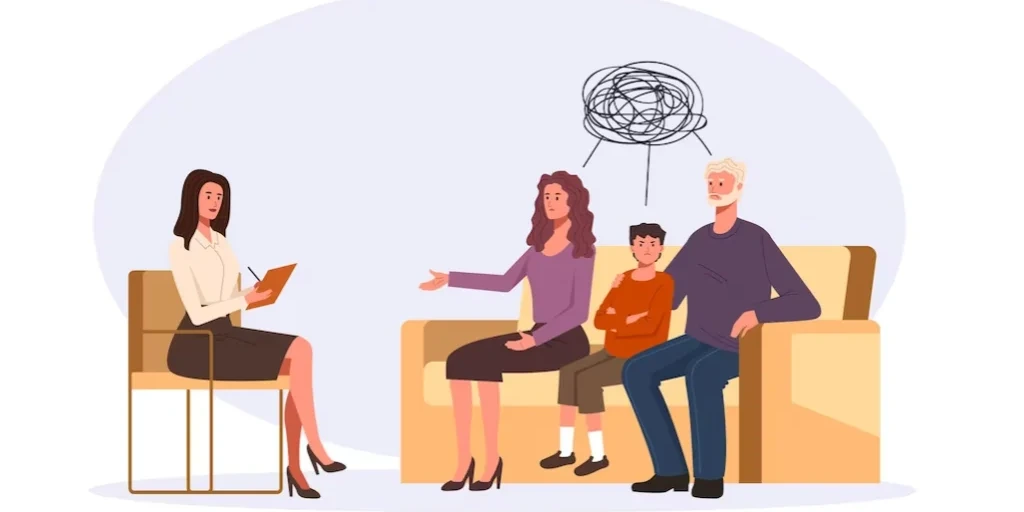24/7 Helpline:
(866) 899-111424/7 Helpline:
(866) 899-1114
Learn more about Depression Treatment centers in Alma
Depression Treatment in Other Cities

Other Insurance Options

Sliding scale payment assistance

BHS | Behavioral Health Systems

PHCS Network

Sutter

Providence

UMR

Self-pay options

Multiplan

Holman Group

United Health Care

Highmark

Molina Healthcare

Humana

Evernorth

CareFirst

BlueShield

MVP Healthcare

Ceridian

Medical Mutual of Ohio

MHNNet Behavioral Health




Assisted Recovery Centers of America
Assisted Recovery Centers of America (ARCA) is a mental health recovery and drug and alcohol addicti...

Harris House
Harris House is a private alcohol and drug addiction recovery center in Saint Louis, Missouri. They ...

Missouri Network Outreach Center
Missouri Network Outreach Center is a non-profit rehab located in Saint Louis, Missouri. Missouri Ne...

Preferred Family Healthcare – Adolescent
Preferred Family Healthcare – Adolescent is a private rehab located in Saint Louis, Missouri. Prefer...

Midwest Institute for Addiction
Midwest Institute for Addiction provides a comprehensive set of solutions for those dealing with alc...

Clayton Behavioral
Clayton Behavioral is a private rehab located in Saint Louis, Missouri. Clayton Behavioral specializ...

Saint Louis Behavioral Medicine Institute
Saint Louis Behavioral Medicine Institute, located in Saint Louis, Missouri, offers behavioral healt...

Preferred Family Healthcare – Bridgeway Behavioral Health – Dunnica
Preferred Family Healthcare - Bridgeway Behavioral Health - Dunnica offers a residential and outpati...

ADAPT of Missouri
ADAPT of Missouri is a private rehab located in Saint Louis, Missouri. ADAPT of Missouri specializes...

Places for People – Lindeil Boulevard
Places for People – Lindeil Boulevard is a private rehab located in Saint Louis, Missouri. Places fo...

Salvation Army – Harbor Light Center
The Salvation Army Harbor Light Center is a drug and alcohol rehab facility located in Saint Louis M...

Hyland Behavioral Health System
Hyland Behavioral Health System, located in St. Louis, Missouri, provides education, prevention, and...

Hawthorn Childrens Psychiatric Hospital
Hawthorn Childrens Psychiatric Hospital is a public rehab located in Saint Louis, Missouri. Hawthorn...

Assessment & Counseling Solutions
Assessment & Counseling Solutions offers outpatient treatment for individuals with alcohol and/or su...

Oxford House Gravois
Oxford House Gravois is a non-profit house located in Saint Louis, MO. Oxford House Gravois helps in...

Westend Clinic
Westend Clinic is a private rehab located in Saint Louis, Missouri. Westend Clinic specializes in th...

Preferred Family Healthcare – Bridgeway
Preferred Family Healthcare - Bridgeway offers an outpatient program, day treatment, and SATOP. Pref...

Provident – Downtown
Provident – Downtown is a private rehab located in Saint Louis, Missouri. Provident – Downtown speci...

Stepping Into The Light Ministry
Stepping Into The Light Ministry is a private rehab located in Saint Louis, MO. Stepping Into The Li...

Gateway Alcohol and Drug Treatment Center
Gateway Alcohol and Drug Treatment Center, in Saint Louis, Missouri, is a 12 step focused outpatient...

Concordance Academy – Re Entry Model
Concordance Academy assists individuals returning from prison. They offer the first set of holistic,...

Avenues Counseling Center
Avenues Counseling Center is a private rehab located in Saint Louis, Missouri. Avenues Counseling Ce...

INSynergy – Personalized Addiction Treatment
INSynergy is a drug and alcohol addiction rehab center located in Saint Louis, MO. It provides men a...

INSynergy
INSynergy is a private rehab located in Saint Louis, Missouri. INSynergy specializes in the treatmen...

Hotel California by the Sea – St. Louis
Hotel California by the Sea – St. Louis is a private rehab located in Saint Louis, Missouri. Hotel C...

Mercy Hospital – Behavioral Health
Mercy Hospital - Behavioral Health is located in Saint Louis, Missouri. Mercy Hospital - Behavioral ...

Harris House Treatment on South Broadway
Harris House Treatment on South Broadway is a private rehab located in Saint Louis, Missouri. Harris...

Preferred Family Healthcare – Bridgeway Behavioral Health – Delmar
The Preferred Family Healthcare Delmar facility stands as a substance abuse rehab center in Saint Lo...

Tompkins County Mental Health Services
Tompkins County Mental Health Services is a public rehab located in Ithaca, New York. Tompkins Count...

Cayuga Medical Center at Ithaca – Psychiatric
Cayuga Medical Center at Ithaca – Psychiatric is a private rehab located in Ithaca, New York. Cayuga...

Cayuga Addiction Recovery Services Outpatient
Cayuga Addiction Recovery Services Outpatient is a private rehab located in Ithaca, New York. Cayuga...

Alcohol and Drug Council of Tompkins County
Alcohol and Drug Council of Tompkins County provides counseling for individuals and families in an o...

Youth Advocate Programs – Topkins County
Youth Advocate Programs is a counseling clinic located in Ithaka, NY. Youth Advocate Programs specia...

Family and Childrens Service of Ithaca
Family and Childrens Service of Ithaca is a private service agency of rehab located in Ithaca, NY. F...












































































































































Recovery Unlimited Counseling Services
Recovery Unlimited Counseling Services is a private rehab located in Saint Louis, Michigan. Recovery...

Great Circle – Saint Louis
Great Circle – Saint Louis is a private rehab located in Saint Louis, Missouri. Great Circle – Saint...

St Louis County Community Services
St Louis County Community Services is a private rehab located in Saint Louis, Missouri. St Louis Cou...

BJC Behavioral Health – South Site
BJC Behavioral Health – South Site is a private rehab located in Saint Louis, Missouri. BJC Behavior...

Valley Hope
Valley Hope of St. Louis provides a full range of outpatient substance use disorder services to adul...

AA – Alcoholics Anonymous – South Big Bend Boulevard
AA – Alcoholics Anonymous – South Big Bend Boulevard is a non-profit rehab located in Saint Louis, M...

Preferred Family Healthcare – Bridgeway Behavioral Health
Preferred Family Healthcare - Bridgeway Behavioral Health offers an outpatient program, day treatmen...

Mahalo Counseling Center
Mahalo Counseling Center is a private rehab located in Saint Louis, Missouri. Mahalo Counseling Cent...

EMASS
EMASS (Eastern Missouri Alternative Sentencing Services) is a privately owned company. EMASS provide...

Oxford House – Lusher Road
Oxford House - Lusher Road is an inpatient rehab for men located in Saint Louis, MO. Oxford House - ...

Black Alcohol – Drug Services
Black Alcohol – Drug Services is a private rehab located in Saint Louis, Missouri. Black Alcohol – D...

Childrens Home Society – Saint Louis
Childrens Home Society – Saint Louis is a non-profit rehab located in Saint Louis, Missouri. Childre...

Trend – NCADA
Trend – NCADA is a private rehab located in Saint Louis, Missouri. Trend – NCADA specializes in the ...

Provident – South County
Provident – South County is a private rehab located in Saint Louis, Missouri. Provident – South Coun...

BJC Behavioral Health – Central Site
BJC Behavioral Health Central Site is an accredited behavioral health center that offers substance a...

Preferred Family Healthcare
Preferred Family Healthcare is a private rehab located in Saint Louis, Missouri. Preferred Family He...

New Beginnings
New Beginnings is a private rehab located in Saint Louis, Missouri. New Beginnings specializes in th...

Positive Choices
Positive Choices is a private rehab located in Saint Louis, Missouri. Positive Choices specializes i...

Serenity Services
Serenity Services is a private rehab located in Saint Louis, Missouri. Serenity Services specializes...

AA – Alcoholics Anonymous
AA – Alcoholics Anonymous is a private rehab located in Saint Louis, Missouri. AA – Alcoholics Anony...

CenterPointe Outpatient Services – West County
CenterPointe Outpatient Services - West County is located in Saint Louis, Missouri. CenterPointe Out...

Al Anon
Al Anon is a private rehab located in Saint Louis, Missouri. Al Anon specializes in the treatment of...

Millennium IOP
Millennium IOP is a private rehab located in Saint Louis, Missouri. Millennium IOP specializes in th...

SATOP
SATOP is a private rehab located in Saint Louis, Missouri. SATOP specializes in the treatment of Sub...

The Place
The Place is a private rehab located in Saint Louis, Missouri. The Place specializes in the treatmen...

AA – Alcoholics Anonymous
AA – Alcoholics Anonymous is a non-profit rehab located in Ithaca, New York. AA – Alcoholics Anonymo...


























































